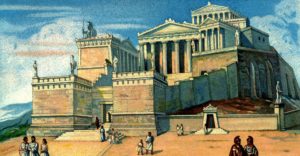 Many American cities in today’s age are appended with the word “polis”. The literal translation of the word is “city”, so cities such as Minneapolis, Annapolis, and Indianapolis are exercising a tradition with origin in Ancient Greece by giving their city a name that includes “polis.” The Polis, or City-State, was developed in the ancient world, and many places in Ancient Greece were structured this way. Here’s more information about how the polis developed in Ancient Greece:
Many American cities in today’s age are appended with the word “polis”. The literal translation of the word is “city”, so cities such as Minneapolis, Annapolis, and Indianapolis are exercising a tradition with origin in Ancient Greece by giving their city a name that includes “polis.” The Polis, or City-State, was developed in the ancient world, and many places in Ancient Greece were structured this way. Here’s more information about how the polis developed in Ancient Greece:
Origins of the Polis
The term is believed to have originated between 800 B.C. and about 480 B.C which is the Archaic Period of Greece. The word polis can also indicate a “gathering of people,” which also made it accurate when describing the populations of cities. Historians say that not all ancient Greek cities were necessarily called a polis, but the word more specifically refers to those that were distinct city-states ruled democratically by their body of citizens.
Cities such as Tire or Sidon had significant populations but fell under the rule of a king or a small powerful oligarchy of rulers. That means these cities would not have been referred to as a polis. It should be noted, however, that there is some debate and disagreement about this among archaeologist and historians. Sparta, for example, was called a polis but was actually an aggregate of several villages.
What Philosophers Had to Say About the Polis
Two of ancient Greece’s greatest philosophers, Plato and Socrates, had much to say about the nature and character of the polis. Plato said that the best city-states embodied organized principles that emphasized the greatest good for all citizens. His concept of a well-run polis was not necessarily based on a democratic model.
Instead, Plato believed that a polis ruled by what he called a “philosopher king” created the best conditions for all citizens. He compared a philosopher king to a man who guided a ship, steering it in the best direction. This gave rise to the common term, “ship of state.”
Plato’s concepts do not preclude the possibility that a polis could be a democracy, however. It would be the citizens who would choose or elect their philosopher king.Socrates offered that two primary underlying principles were necessary to form a thriving polis that was a good place to live. These were the mutual needs of the citizens and differences in aptitude among the people.
Five Segments, Four Virtues
BothSocrates and Platoidentifiedfive important segment of polis society: producers, merchants, seamen (sailors and shipowners), retail traders and wage earners.
Socrates then saidthat four virtues should inform or be infused with the society of a polis and manifested by all people in each of the five class segments. These four virtues are wisdom, courage, moderation and justice. To the degree to which the citizens could exemplify these virtues, the polis would form a “just society.”
The idea of the polis and the Greek city state has had enormous and lasting influence on western culture. The characteristics of a polis as described by Plato, Socrates and many other great thinkers, such as Cleisthenes of Athens, formedthe foundation upon which our concept of a free and democratic government rest today.